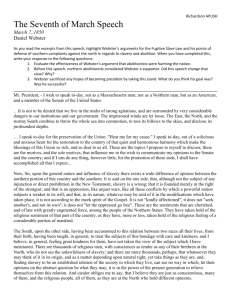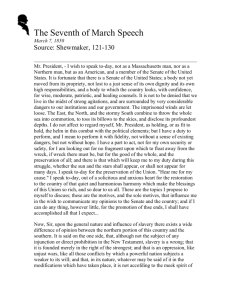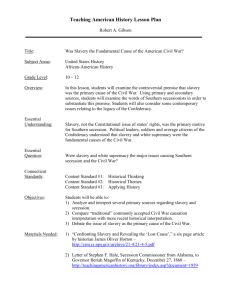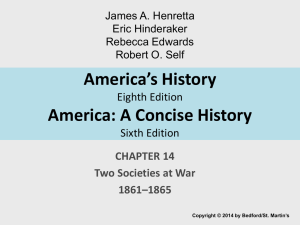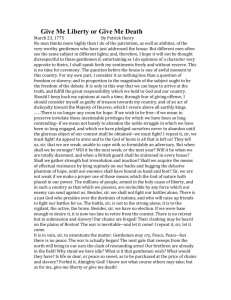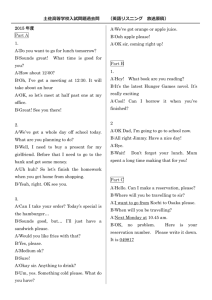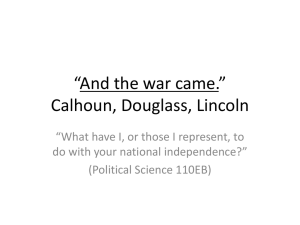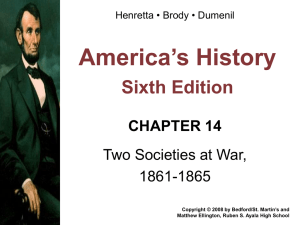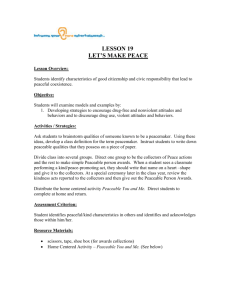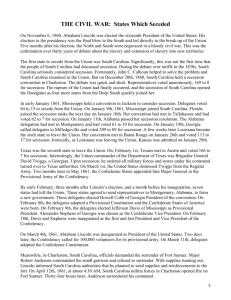Webster`s 7th of March Speech
advertisement
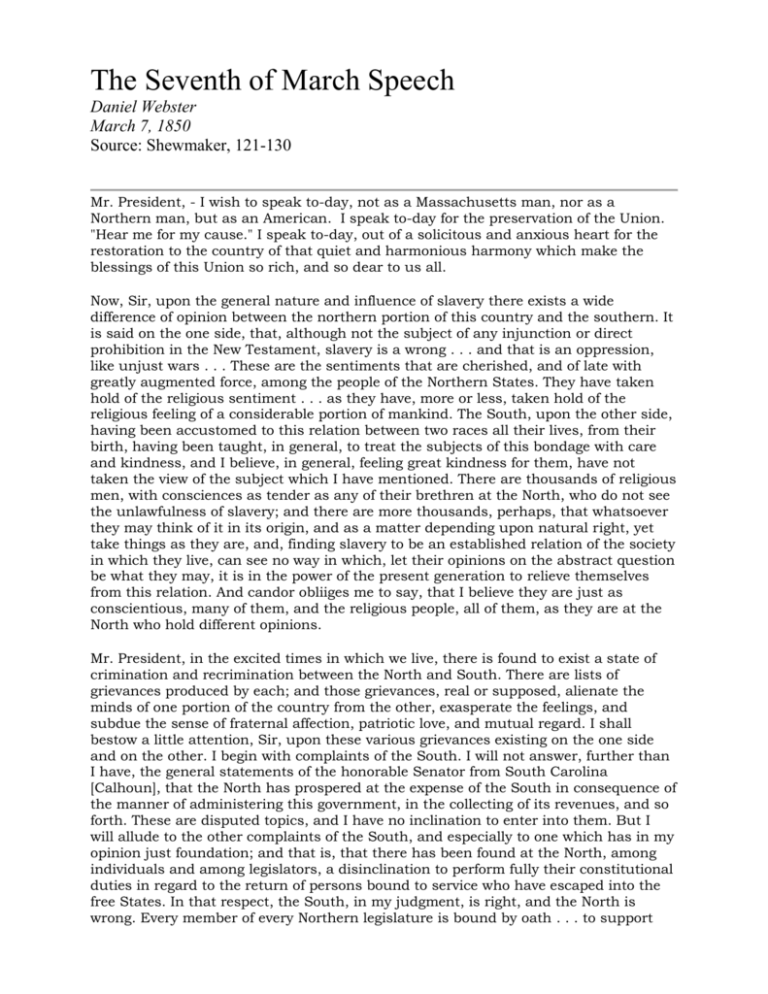
The Seventh of March Speech Daniel Webster March 7, 1850 Source: Shewmaker, 121-130 Mr. President, - I wish to speak to-day, not as a Massachusetts man, nor as a Northern man, but as an American. I speak to-day for the preservation of the Union. "Hear me for my cause." I speak to-day, out of a solicitous and anxious heart for the restoration to the country of that quiet and harmonious harmony which make the blessings of this Union so rich, and so dear to us all. Now, Sir, upon the general nature and influence of slavery there exists a wide difference of opinion between the northern portion of this country and the southern. It is said on the one side, that, although not the subject of any injunction or direct prohibition in the New Testament, slavery is a wrong . . . and that is an oppression, like unjust wars . . . These are the sentiments that are cherished, and of late with greatly augmented force, among the people of the Northern States. They have taken hold of the religious sentiment . . . as they have, more or less, taken hold of the religious feeling of a considerable portion of mankind. The South, upon the other side, having been accustomed to this relation between two races all their lives, from their birth, having been taught, in general, to treat the subjects of this bondage with care and kindness, and I believe, in general, feeling great kindness for them, have not taken the view of the subject which I have mentioned. There are thousands of religious men, with consciences as tender as any of their brethren at the North, who do not see the unlawfulness of slavery; and there are more thousands, perhaps, that whatsoever they may think of it in its origin, and as a matter depending upon natural right, yet take things as they are, and, finding slavery to be an established relation of the society in which they live, can see no way in which, let their opinions on the abstract question be what they may, it is in the power of the present generation to relieve themselves from this relation. And candor obliiges me to say, that I believe they are just as conscientious, many of them, and the religious people, all of them, as they are at the North who hold different opinions. Mr. President, in the excited times in which we live, there is found to exist a state of crimination and recrimination between the North and South. There are lists of grievances produced by each; and those grievances, real or supposed, alienate the minds of one portion of the country from the other, exasperate the feelings, and subdue the sense of fraternal affection, patriotic love, and mutual regard. I shall bestow a little attention, Sir, upon these various grievances existing on the one side and on the other. I begin with complaints of the South. I will not answer, further than I have, the general statements of the honorable Senator from South Carolina [Calhoun], that the North has prospered at the expense of the South in consequence of the manner of administering this government, in the collecting of its revenues, and so forth. These are disputed topics, and I have no inclination to enter into them. But I will allude to the other complaints of the South, and especially to one which has in my opinion just foundation; and that is, that there has been found at the North, among individuals and among legislators, a disinclination to perform fully their constitutional duties in regard to the return of persons bound to service who have escaped into the free States. In that respect, the South, in my judgment, is right, and the North is wrong. Every member of every Northern legislature is bound by oath . . . to support the Constitution of the United States . . . I have always thought that the Constitution addressed itself to the legislatures of the States or to the States themselves . . . I repeat, therefore, Sir, that here is a well-founded ground of complaint against the North, which ought to be removed . . . in the several States, to do all that is necessary for the recapture of fugitive slaves and for their restoration to those who claim them . Mr. President, I should much prefer to have heard from every member on this floor declarations of opinion that this Union could never be dissolved, than the declaration of opinion by any body, that, in any case, under the pressure of any circumstances, such a dissolution was possible. I hear with distress and anguish the word "secession," especially when it falls from the lips of those who are patriotic, and known to the country, and known all over the world, for their political services. Secession! Peaceable secession! Sir, your eyes and mine are never destined to see that miracle. The dismemberment of this vast country without convulsion! The breaking up of the fountains of the great deep without ruffing the surface! Who is so foolish, I beg every body's pardon, as to expect to see any such thing? . . . There can be no such thing as peaceable secession. Peaceable secession is an utter impossibility. Is the great Constitution under which we live, covering this whole country, is it to be thawed and melted away by secession, as the snows on the mountain melt under the influence of a vernal sun, disappear almost unobserved, and run off? No, Sir! No, Sir! I will not state what might produce the disruption of the Union; but, Sir, I see as plainly as I see the sun in heaven what that disruption itself must produce; I see that it must produce war, and such a war as I will not describe, in its twofold character. Peaceable secession! Peaceable secession! . . . Why, what would be the result? Where is the line to be drawn? What States are to seceded? What is to remain American? What am I toe? An American no longer? Am I to become a sectional man, a local man, a separatist, with no country in common with the gentlemen who sit around me here, or who fill the other house of Congress? Heaven forbid! Where is the flag of the republic to remain? . . . I know, although the idea has not been stated distinctly, there is to be, or it is supposed possible that there will be, a Southern Confederacy . . . I have heard it suggested elsewhere, that the idea has been entertained, that, after the dissolution of this Union, a Southern Confederacy might be formed. I am sorry . . . We could not separate the States by any such line, if we were to draw it. . . There are natural causes that would keep and tie us together . . . And now, Mr. President, instead of speaking of the possibility or utility of secession . . . let us enjoy the fresh air of Liberty and Union . . . for the preservation of this Constitution and the harmony and peace of all who are destined to live under it. Let us make our generation one of the strongest and brightest links in that golden chain which is destined . . . to grapple the people of all the States to this Constitution for ages to come. We have a great, popular, constitutional government, guarded by law and by judicature, and defended by the affections of the whole people. No monarchical throne presses these States together, no iron chain of military power encircles them; they live and stand under a government popular in its form, representative in its character, founded upon principles of equality, and so constructed, we hope, as to last forever . . . The two great seas of the world wash the one and the other shore.
